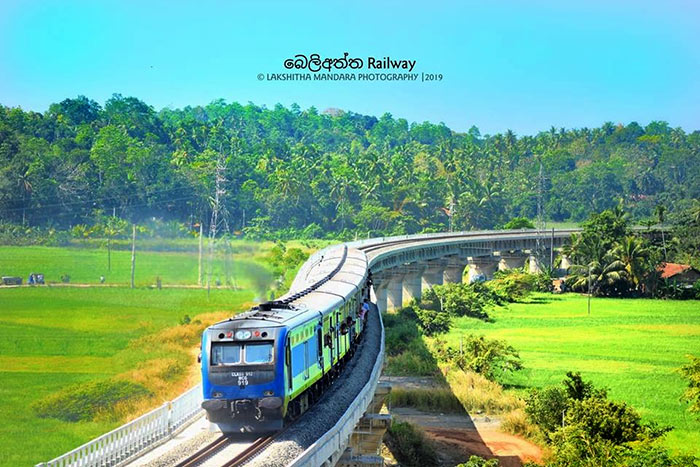First train service on Matara-Beliatta railway line commissioned

The first test drive on the newly constructed Matara-Beliatta railway line was commissioned yesterday(6) by the Minister of Transport and Civil Aviation, Arjuna Ranatunga.
The railway extension project costing US$ 278 million was financed by the Exim Bank of China.
Meanwhile, a group of people, who were holding the placards of … Opposition Leader Mahinda Rajapaksa, protested the arrival of Minister of Transport and Civil Aviation Arjuna Ranatunga at Beliatta and Bambaranda railway stations to commission the first train service of Marata- Beliatta line yesterday (6).
The protestors shouted slogans saying that the Present Government or the Ministers have no ethical right to open the railway line, which was initiated by former President Mahinda Rajapaksa.
Addressing the media, Ranatunga said“ we should not forget that ordinary people pay for these development projects through taxes. No one has contributed their personal wealth to these projects. Neither former President Mahinda Rajapaksa, President Maitripala Sirisena nor I, personally fund these projects out of our own money. We should shed the detrimental party politics when it comes to development”.
“ This type of activities are instigated by the members of Pradeshiya Sabha and that culture existed in the country before the Good Governance Government came to power in 2015”, he further said. Matara-Beliatta railway line is the first railway line which was constructed in Sri Lanka since 1948. The extension was 26.75 km long and contains the longest and second longest railway bridges — of 1.5 km and 1.04 km length respectively, one of the tallest railway bridges (the 18.2m tall Werala-goda bridge); the longest railway tunnel ( 615 metres long Nakkutiya tunnel) as well as the most modern railway station buildings in the country.
However, people of the area welcomed the new railway service by taking a ride in the new train.
(Source: Ceylon Today – By Gayathri Gunasekera and Upatissa Perera)
Latest Headlines in Sri Lanka
- Sri Lanka declares essential services to ensure recovery after Cyclone Ditwah January 31, 2026
- Sri Lanka disburses Rs. 50,000 relief to 70% of Cyclone Ditwah victims January 31, 2026
- Sri Lanka to launch national review on social media’s impact on children January 30, 2026
- Sri Lanka, Saudi Arabia move to boost industrial cooperation January 30, 2026
- Johnston Fernando, two sons and others further remanded until February 13, 2026 January 30, 2026


